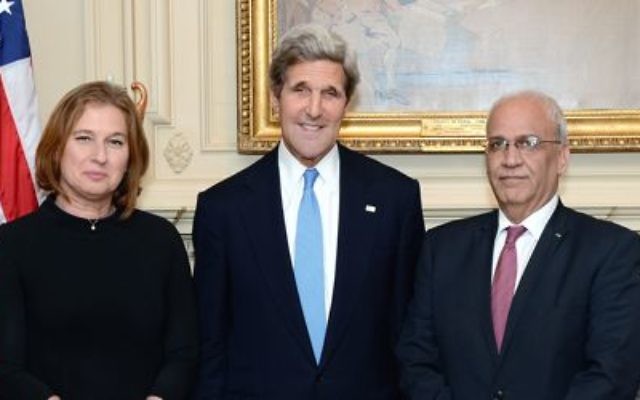An ‘appalling’ price to pay for peace talks
COMMUNAL leaders have expressed their dismay at the price Israel has had to pay for the resumption of peace talks. Ahead of meetings in Washington this week, the Palestinians said they would only come to the table if Israel agreed to release 104 prisoners.
COMMUNAL leaders have expressed their dismay at the price Israel has had to pay for the resumption of peace talks. Ahead of meetings in Washington this week, the Palestinians said they would only come to the table if Israel agreed to release 104 prisoners.
The negotiations, hosted by US Secretary of State John Kerry, with Sydney-educated Martin Indyk acting as broker, saw Israeli Justice Minister Tzipi Livni and chief Palestinian negotiator Saeb Erekat agree to resume talks for the first time in three years, with a view to reaching a final status agreement within nine months.
But Israeli Prime Minister Benjamin Netanyahu drew criticism from within Israel and the Diaspora for agreeing to the Palestinian demand to release the prisoners, many of whom are convicted killers and terrorists.
While Zionist Federation of Australia president Philip Chester conceded that living in Australia “we are not in a position to judge the Israeli government,” he added, “we think it is intolerable that Israel has to agree in advance to the release of many terrorists with blood on their hands.
“It is appalling that Israel is being put in this situation before the meeting in Washington has even begun, and the Palestinians have not offered any concessions.”
Executive Council of Australian Jewry president Danny Lamm said Israel’s “brave people and government” had at various times in its history been faced with agonising choices in the quest for peace.
“The release, in stages, of 104 Palestinian prisoners as a means of resuming direct peace negotiations with the Palestinians is the latest such choice,” he said.
“Some of the prisoners are cold-blooded butchers of men, women and children. While many people will have reservations about releasing them, we must all respect the fact that only the democratically elected government of Israel has the right to make the final decision.”
Australia/Israel & Jewish Affairs Council (AIJAC) executive director Dr Colin Rubenstein acknowledged the decision was agonising, especially for the distraught families of terror victims, but said it reflected the high priority Israel attaches to bringing the Palestinians back to the negotiating table. “AIJAC sincerely hopes that this latest gesture for peace will be met with similar confidence-building measures from the Palestinian side and contribute to achieving a just, permanent, negotiated settlement,” he said.
But Australian immigrant to Israel Arnold Roth, whose daughter Malki was murdered in a suicide bombing in Jerusalem in 2001, told The AJN the prisoner deal was “wrong on many levels, and cannot be justified on any”.
“[Netanyahu] ignored the legal justice system which sentenced these prisoners to long-term incarceration,” he said.
“He ignored the entitlement of all Israeli citizens to believe the system of law and order in Israel is free of interference from politicians.
“He ignored what he himself knows to be true about negotiating with the terrorists and releasing them from prison under pressure.”
For full coverage and comment, see this week’s AJN.
GARETH NARUNSKY
Israeli Justice Minister Tzipi Livni, US Secretary of State John Kerry and chief Palestinian negotiator Saeb Erekat.


comments